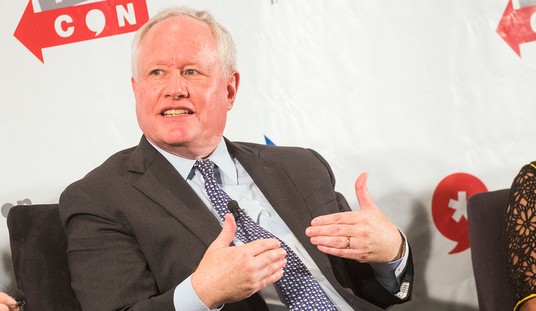Out: Conflict of interest concerns — mostly, anyway. In: Follow the money! According to Jason Miller, spokesman for Donald Trump’s presidential transition, the president-elect sold off his entire stock portfolio in June. That may have made Trump a cool $40 million, according to the Washington Post:
President-elect Donald Trump sold all his shares in companies in June, his spokesman said Tuesday, a move that could have created a cash windfall as he ramped up to begin a costly general election presidential campaign that at the time he claimed he would personally support with “major contributions.”
The sell-off could help address conflict-of-interest worries about his stock portfolio, a sizable part of Trump’s financial life that was worth roughly as much as $40 million as of December 2015, a May disclosure filing shows.
That moots much of the concern over Trump’s potential conflicts of interest as president, but not all of it. There’s still the matter of his own businesses, which have global reach and have been a focus of concern for both the media and government-transparency activists. Trump promised to hold a press conference next week to detail how he will devolve control of the Trump empire to his family, but so far that’s about all that has been discussed — that it will take place, not how, or what connections Trump might maintain.
Critics offered cautious praise for the move, including Norm Eisen, Barack Obama’s “ethics counselor.” After reversing course on Trump’s potential conflicts, though, Eisen now wants Trump to explain what he did with the cash:
Norm Eisen, who served as ethics counselor to President Obama and has criticized Trump over his conflicts, said it would be “absolutely a step in the right direction” if Trump had sold his stock holdings in June, divesting himself of ownership in companies whose fates could be tied to his policies. But he added that it is now important to know how Trump spent the money he earned from the sale.
“We need to know, has he put them in conflict free assets … or has he bought other stocks or assets that would create new conflicts?” he asked. “It’s all the more reason that we need a prompt and full disclosure financial disclosure. If he did liquidate all his stocks, what did he do with the money? What bank is the money in? What did he buy? It’s a lot of money.”
Those might be interesting questions, except Eisen’s not the man to raise them. Readers might recall Eisen’s involvement in the sacking of Gerald Walpin in 2009 as Inspector General for the Corporation for National and Community Service. Walpin had complained to Congress when the White House made a deal with Sacramento mayor and Barack Obama supporter Kevin Johnson to free him up to handle federal grants after Walpin pressed for a fraud prosecution. Eisen responded by telling people that Walpin had essentially gone senile and hadn’t shown up for work, and the Obama administration demanded a resignation from Walpin. When he refused, he got fired. Eisen got rewarded with an appointment as ambassador to the Czech Republic; Walpin got stiffed; Johnson was able to keep his office. (Walpin died in June of this year after being struck by an SUV in Manhattan.) Maybe the Post should have found a different critic when it comes to conflicts of interest.
That said, there are a couple of questions remaining on this. Why not just announce the sale on November 9th, after the election, and head off the non-Trump-business conflict of interest discussions? For that matter, why not announce it in June to show Trump’s seriousness about the campaign? As for where the money went, the Post’s Drew Harwell and Rosalind Helderman point out that the sale preceded some large donations to the Trump campaign that totaled $16 million or so. After taxes (depending on the capital gains that resulted), that would certainly account for some of the rest of the projected $40 million in proceeds. What remains liquid out of that doesn’t seem large enough to present a significant conflict with policy. We’ll know when the next financial disclosure is due … in May 2018.







Join the conversation as a VIP Member